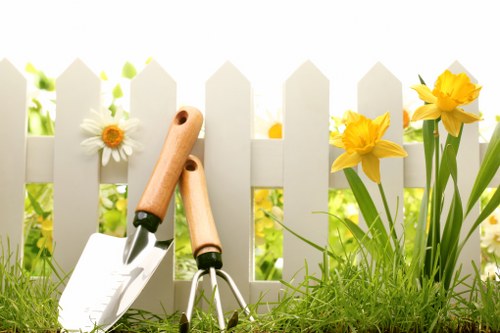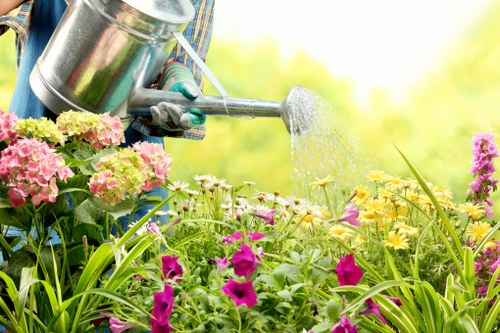Comprehensive Garden Maintenance in West Ham
Introduction to Garden Maintenance

Maintaining a beautiful garden requires dedication, knowledge, and the right tools. In West Ham, homeowners understand the importance of keeping their gardens pristine all year round. Whether you have a sprawling backyard or a small balcony garden, proper maintenance ensures your outdoor space remains vibrant and healthy.
Garden maintenance encompasses a variety of tasks, from regular mowing and pruning to seasonal planting and pest control. Each task plays a critical role in the overall health and aesthetics of your garden. Understanding these tasks and performing them diligently can transform your garden into a serene and attractive oasis.
In this article, we'll explore the essential aspects of garden maintenance in West Ham, providing you with tips and strategies to keep your garden in top shape.
Seasonal Garden Care

One of the key aspects of garden maintenance is adapting your care routine to the changing seasons. Each season brings its own set of challenges and opportunities for your garden.
Spring: Spring is the time for renewal. It's essential to prepare your garden for the growing season by clearing out debris, pruning dead branches, and planting new flowers and vegetables.
Summer: In summer, focus on watering, weeding, and protecting your plants from pests. Regular mowing and fertilizing can also help maintain the health of your lawn and garden beds.
Essential Garden Tools

Having the right tools is crucial for effective garden maintenance. Investing in quality tools can make your gardening tasks easier and more efficient.
Basic Tools:
- Pruning shears
- Garden gloves
- Spade and shovel
- Rake
- Garden hose or watering can
Advanced Tools:
- Lawn mower
- Hedge trimmer
- Wheelbarrow
- Soil tester
- Compost bin
Plant Care and Selection

Choosing the right plants for your garden is fundamental to its success. In West Ham, it's important to select plants that thrive in the local climate and soil conditions.
Consider native plants as they are well-adapted to the area, require less maintenance, and support local wildlife. Additionally, mix various plant types to ensure year-round interest and a balanced ecosystem.
Regular watering, mulching, and feeding your plants with appropriate fertilizers will promote healthy growth and prevent diseases.
Pest and Weed Management

Managing pests and weeds is a continuous battle in garden maintenance. Effective control methods help maintain the beauty and health of your garden.
Implementing organic pest control solutions, such as introducing beneficial insects, can reduce the need for chemical pesticides. For weed management, regular weeding and the use of mulch can keep unwanted plants at bay.
Monitoring your garden regularly for signs of pests and diseases allows for early intervention, preventing larger infestations and damage.
Lawn Care Tips
A well-maintained lawn is the centerpiece of any garden. Proper lawn care involves mowing, watering, fertilizing, and aerating the soil.
Mowing: Regular mowing at the correct height promotes healthy grass growth and prevents weeds from taking over. Avoid cutting too short, as this can stress the grass and make it more susceptible to disease.
Watering: Water your lawn deeply but infrequently to encourage deep root growth. Early morning watering reduces evaporation and fungal diseases.
Hardscaping and Garden Structures
Incorporating hardscaping elements, such as pathways, patios, and fences, adds functionality and visual appeal to your garden.
Pathways: Creating clear pathways guides visitors through your garden and highlights key features. Materials like gravel, brick, or stone can complement your garden's aesthetic.
Patios: A patio provides a space for relaxation and entertaining. Choose materials and designs that fit your lifestyle and garden layout.
Seasonal Planting Schedule
Planning your planting schedule around the seasons ensures continuous blooms and productivity in your garden.
Spring Planting: Focus on planting bulbs, perennials, and annuals that bloom in the warmer months. Early vegetables like peas and lettuce can be sown as well.
Autumn Planting: Fall is ideal for planting trees, shrubs, and hardy perennials. It's also a great time to prepare your garden for winter by adding compost and mulch.
Soil Health and Improvement
Healthy soil is the foundation of a thriving garden. Regularly testing your soil and amending it as needed ensures your plants receive the nutrients they require.
Soil Testing: Conduct soil tests to determine pH levels and nutrient deficiencies. This information helps you choose the right fertilizers and soil amendments.
Organic Matter: Adding compost or well-rotted manure improves soil structure, fertility, and drainage. It also encourages beneficial microorganisms that support plant health.
Mulching Techniques
Mulching is a simple yet effective technique for maintaining garden health. It helps retain moisture, suppress weeds, and regulate soil temperature.
Organic mulches, such as bark, straw, or leaf mold, break down over time, enriching the soil. Inorganic mulches, like gravel or black plastic, provide longer-lasting weed control and moisture retention.
Apply mulch in a layer 2-3 inches thick around your plants, avoiding direct contact with stems or trunks to prevent rot and disease.
Pruning and Trimming
Regular pruning and trimming are essential for maintaining the shape and health of your plants and trees.
Pruning: Remove dead, diseased, or crossing branches to improve air circulation and prevent the spread of pests.
Trimming: Keep shrubs and hedges in desired shapes and sizes. Overgrown plants can become unsightly and hinder the growth of new shoots.
Water Management Strategies
Efficient water management is crucial, especially during dry spells. Implementing water-saving techniques ensures your garden remains lush without excessive water usage.
Drip Irrigation: Drip systems deliver water directly to plant roots, minimizing evaporation and runoff.
Rainwater Harvesting: Collecting rainwater in barrels reduces dependence on municipal water sources and provides a sustainable water supply for your garden.
Garden Lighting Ideas
Enhancing your garden with lighting adds safety and creates a magical atmosphere during evenings.
Solar-powered lights are an eco-friendly option, providing illumination without increasing energy costs. Pathway lights, spotlights, and string lights can highlight garden features and create inviting spaces for relaxation.
Strategically placed lighting can also deter pests and enhance the visual appeal of your garden at night.
Creating a Sustainable Garden
Embracing sustainability in your garden maintenance practices benefits both the environment and your garden's health.
Composting: Recycling garden waste into compost enriches your soil naturally, reducing the need for chemical fertilizers.
Native Plants: Incorporating native species supports local biodiversity and requires less water and maintenance.
Hiring Professional Garden Maintenance Services
While DIY garden maintenance can be rewarding, hiring professional services in West Ham offers expertise and efficiency.
Professional gardeners have the knowledge and tools to handle complex tasks, ensuring your garden receives comprehensive care. They can also provide tailored maintenance plans to suit your garden's specific needs.
Benefits of Hiring Professionals:
- Time-saving
- Expertise and knowledge
- Access to specialized equipment
- Consistent and reliable maintenance
Cost-Effective Garden Maintenance Tips
Maintaining a beautiful garden doesn't have to break the bank. Implementing cost-effective strategies can help you manage expenses without compromising quality.
DIY Projects: Engage in do-it-yourself projects like building raised beds, composting, and creating garden decor to save money.
Preventative Care: Regular maintenance prevents costly repairs and replacements by addressing issues early.
Common Garden Maintenance Mistakes to Avoid
Avoiding common pitfalls can enhance the effectiveness of your garden maintenance efforts.
Overwatering: Excessive watering can lead to root rot and plant diseases. Always check soil moisture before watering.
Neglecting Soil Health: Ignoring soil quality can result in poor plant growth. Regularly test and amend your soil as needed.
Integrating Wildlife-Friendly Practices
Creating a garden that attracts and supports wildlife adds life and diversity to your outdoor space.
Bird Feeders: Installing bird feeders encourages birds to visit your garden, helping with pest control.
Bat Boxes: Bats are natural predators of many garden pests. Providing bat boxes can enhance your garden's ecological balance.
Maintaining Garden Paths and Walkways
Well-maintained paths and walkways enhance the functionality and aesthetics of your garden.
Regularly clear debris and weeds from paths to ensure safe and easy navigation. Repair any cracks or uneven surfaces to prevent accidents and maintain a polished look.
Choosing durable materials that complement your garden's style can long-term beauty and practicality.
Eco-Friendly Fertilizing Methods
Using eco-friendly fertilizing methods promotes sustainable garden practices and healthier plants.
Organic Fertilizers: Compost, manure, and bone meal enrich the soil naturally without harmful chemicals.
Green Manure: Planting cover crops like clover or alfalfa adds nutrients to the soil and improves its structure.
Encouraging Pollinators in Your Garden
Pollinators like bees, butterflies, and hummingbirds are vital for the health and productivity of your garden.
Planting a variety of flowering plants that provide nectar and pollen attracts these beneficial creatures. Avoiding pesticides ensures a safe environment for pollinators to thrive.
Providing habitats, such as bee hotels and butterfly gardens, supports the local pollinator population.
Conclusion
Effective garden maintenance in West Ham involves a combination of regular care, strategic planning, and sustainable practices. By understanding the unique needs of your garden and implementing the tips outlined above, you can enjoy a beautiful and thriving outdoor space year-round.
Whether you choose to maintain your garden yourself or hire professional services, the key is consistency and attention to detail. A well-maintained garden not only enhances your property's aesthetic appeal but also contributes to your overall well-being and quality of life.
Ready to transform your garden? Contact us today to book your garden maintenance service and enjoy a lush, vibrant garden in West Ham!